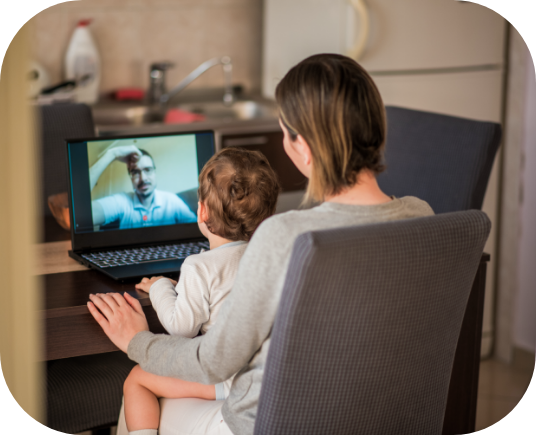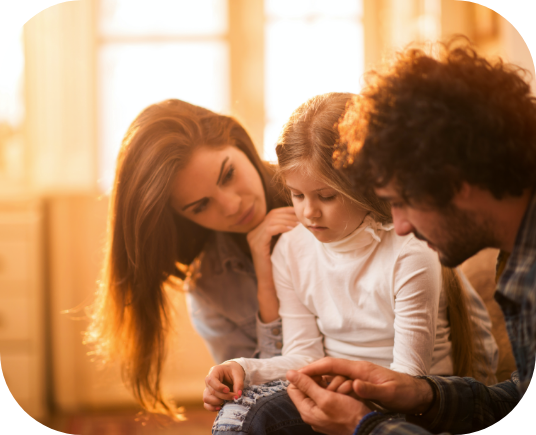

Online Relationships
Online can be fun! There are games, music, and videos. We can talk to friends and family online.
Tips for Keeping Kids Safe Online:
- Do not talk to people you don’t know online
- Remember what you post online is there forever (even if you delete it!)
- Be aware of what you post online. Giving away personal information/pictures of yourself to people you don’t know can be dangerous.
- You own the pictures you post on Facebook and Instagram, but they have the right to use them worldwide. They can use them for advertising.

Building Healthy Relationships Online
Considerations to tell your kids about being online:
- Would you want that to be said or shared about you?
- Would you want someone to stand up and support you?
- Would you care if it was a stranger or another classmate?
- Would you want your social media accounts, followers, and the larger internet platforms we use to share what you have done or said online? Are you wanting positive posts or negative degrading comments?
- Would you care if it was a negative message? How would that impact you and your school/family?
- Would you want your trusted and safe adults (parents, grandparents, teachers, idols) to hear and see what you have posted and said online?
- Would you want them to think less of you for posting something harmful or be proud of how you supported someone else?
- Like our video, is it okay to say and do these things face-to-face, to a classmate you don’t like or another student you don’t know?
- Would someone who doesn’t know what is going on and who sees the behaviour think it was respectful and appropriate or unsafe and harmful?

What are healthy online relationships?
They are:
- Safe
- Comfortable
- They do not ask you to do something you are not comfortable with
- You know them
Remember, what you see online is not always real and what you post online is forever (even if you delete it, it still exists). Be kind to yourself and others online.
What are unhealthy online relationships
Unhealthy relationships online can be with someone your child knows or someone they don’t know.
What Are the Signs?
- The person sends your child a lot of messages often on different platforms
– It could also be their close friends sending them messages, too. Check-in with them! - The person tells your child to keep their conversations secret
- The person asks your child for personal information, like where they go to school or how old they are.
- The person tries to blackmail your child or force them into doing things they are not comfortable doing. The person may try to get your child to send sexual images of themselves or personal details by saying they will be hurt if your child does not send it. If your child has sent information/pictures, the person may threaten they will post it or share the content.
- The person will try to create an emotional connection with your child.
- The person may never show their face or may send pictures of someone else.
- They may try to get your child to:
- Have sexual conversations
- Send naked images or videos of yourself (sexting)
- Sexting is sending sexually explicit images or messages from one person to another using technology.
- The law states that sexting between or regarding anyone under 18 is considered possessing and distributing child pornography. Anyone owning a device or access to these images can be charged.
- The law is concerned about distribution and if one person in the relationship shares those images with other people or the images are leaked.
- Meet up in person
Cyberbullying
Cyberbullying is using technology to be hurtful, like texting mean things or posting things on social media.
For example, sending hurtful or mean messages via text, email, social media, or phone call, sharing an embarrassing picture of someone without permission, threatening to post pictures or personal information, pretending to be someone else online, or creating pages or polls to rate people in a hurtful way.
Cyberbullying is hurtful and some actions can be against the (federal) law. Because technology crosses borders, cyberbullying laws are federal. It can result in jail time, devices can be taken away, and/or paying the victim of the crime.
Sexting/Sharing Intimate Images:
- Sexting is sending sexually explicit images or messages from one person to another using technology.
- The law states that sexting between or regarding anyone under 18 is considered possessing and distributing child pornography. Anyone owning a device or access to these images can be charged.
- The law is concerned about distribution and if one person in the relationship shares those images with other people or the images are leaked.
- Sharing someone’s intimate images without the person’s consent is also a crime regardless of the person’s age. This can be a common form of cyberbullying.
- This can have the same consequences as cyberbullying:
- Jail up to 5 years
- Devices could be taken away
- Could have to pay the victim for costs involving removing the image from the internet or elsewhere
How Do You Deal With Online Bullying?
Things you can do to deal with cyberbullying:
- Block/delete them
- Save the messages for proof
- Do not respond
- Report the bullying to the site, trusted adults, and the police
- Use the bullying helpline at 1-888-456-2323
- Bullying Helpline Chat, click here to be directed to the chat page. It is available from noon to 8pm daily MST
- Call the Kids Help Phone 1-800-668-6868
Remind your child to not believe the mean, hurtful things the person. Cyberbullying is harmful, so it is important to take it seriously.
Trending Topics
Depression
Depression What Is It? Depression is a mood disorder which means it impacts how a person is feeling. It can cause a person to feel
Accidental Overdose
Accidental Overdose What Is it? An overdose is what happens to someone’s body when they take too much of a substance or too many substances.
Online Relationships
Online Relationships Online can be fun! There are games, music, and videos. We can talk to friends and family online. Tips for Being Safe Online:
Online Relationships
Online Relationships Online can be fun! There are games, music, and videos. We can talk to friends and family online. Tips for Being Safe Online:

